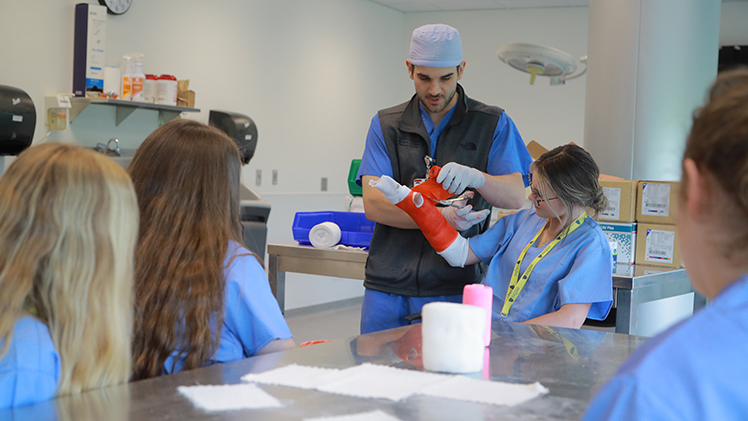Eleven years ago, Andrew Fickert was a soon-to-be high school freshman from a rural farming community who had a nascent interest in science and medicine.
Today he’s a third-year medical student at The University of Toledo, aiming for an eventual residency placement in pediatrics.

Now in its 25th year, CampMed is designed to provide students who excel in science and mathematics a unique window into careers as physicians or medical researchers.
One of the key moments in Fickert’s journey was his participation in CampMed, an immersive two-day educational experience at UToledo that provides students entering the ninth grade behind-the-scenes look at the field of medicine.
“That was my first interaction with medical personnel that wasn’t as a patient,” he said. “I got to see what advanced science might look like for me in the future. It was kind of the arm that pushed the door open, making me realize this could be something I could strive for. It had a fairly sizeable impact.”
Later this week Fickert will return to CampMed to share his story with more than two dozen teens from across northwest Ohio who are participating in this year’s program.
Now in its 25th year, CampMed is designed to provide students who excel in science and mathematics a unique window into careers as physicians or medical researchers.
The 2024 camp will take place on Health Science Campus Thursday and Friday, June 13 and 14.
Under the guidance of UToledo faculty members and clinicians, campers will learn how to use common tools like stethoscopes and otoscopes, try their hand at suturing and applying a cast, and interview simulated patients in the Hillebrand Clinical Skills Center.
They also will receive tours of The University of Toledo Medical Center emergency room, the Jacobs Interprofessional Immersive Simulation Center and the University’s plastination Museum.
“It’s so hands on for them. We’re trying to spark that interest in healthcare,” said Courtney K. Combs, director of the UToledo and Ohio Area Health Education Center programs. “I think it’s impactful for them to be surrounded by other students who are intelligent, motivated and share that interest in science and healthcare.”
Students apply for the program during their 8th grade year. The Area Health Education Centers Program covers the cost of the program, which includes meals and overnight accommodations, for students who are selected to participate.
This year, 26 students from 13 area high schools are participating.
Part of what differentiates CampMed from other experiential high school medicine programs is the age of the campers.
“You see similar programs for juniors and seniors, but by starting out before their freshman year, we’re giving them the best opportunity to maximize their high school coursework in science and math,” she said. “That’s important for the students, but it’s also important for the parents so they can help get their very bright student to that next step.”
In addition to talking with current UToledo medical students about their own paths to medical school, members of UToledo’s undergraduate admissions team will be on hand to provide resources and guidance to help them be successful when the time comes to begin applying to colleges.
Combs said many of the CampMed participants are from rural areas and potential first-generation college students, both of which were the case for Fickert.
After a family move to Colorado from his hometown of Middle Point, Ohio, he attended the University of Northern Colorado, where he studied biology and minored in chemistry. Fickert decided to return to Toledo in part because of the familiarity he had with the medical school.
On his first day at UToledo, he wore his old 2013 CampMed shirt.
“I came from a community where it almost seemed like you farmed or did nothing,” Fickert said. “Being able to pursue something I desired versus something I was told to do, that was enlightening. I didn’t feel trapped in a farming circle or a family business because I was told not only by CampMed but by my parents that if you set your mind to it, you can do it.”
CampMed is organized by the UToledo College of Medicine and Life Sciences and the UToledo Ohio Area Health Education Center program, which works to improve the well-being of individuals and communities by recruiting, training, and retaining healthcare professionals in underserved communities.